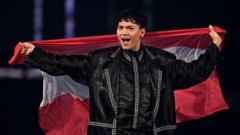Thirty-five seconds. That’s the narrow window available for set changes during the Eurovision Song Contest. This means every member of the backstage crew must execute their tasks with precision to swiftly switch out one act for another. The stakes are high: microphones need adjusting, props must be securely in place, and performers must be ready to shine.
Richard van Rouwendaal, a devoted Dutch stage manager, likens the operation to a Formula 1 pit stop. “Each person in the crew is assigned a single task,” he explains. This high-energy environment ensures actions are coordinated; one misstep could jeopardize the entire performance.
Ahead of the event, the team practices for weeks to perfect their choreography. With meticulous planning, they align their actions to ensure every song finishes without a hitch. “In the two weeks leading up to the event, I evaluate each person's strengths,” says Van Rouwendaal. “It's a real-life game of Tetris trying to fit everything in perfectly.”
During set transitions, there’s a flurry of activity backstage. Stagehands work efficiently alongside lighting and pyrotechnics experts, while dedicated cleaners ensure the stage is spotless for each performance. “Our cleaning team is as crucial as the set crew,” highlights Van Rouwendaal, emphasizing the importance of a pristine stage for professional performances and camera angles.
Elaborate props play a significant role in Eurovision, enhancing each act’s presentation. With each country submitting detailed staging plans, logistics become an intricate puzzle. The props make their way onto the stage based on a carefully devised sequence, minimizing downtime between acts.
Innovative methods, like concealed passageways for moving props, ensure that not a moment is wasted. Defined, rehearsed actions behind the scenes help maintain a smooth show flow – sometimes even allowing surprises, such as a guitar appearing during a performance, courtesy of the crew’s stealthy maneuvers.
However, should an unexpected problem arise, contingencies are in place. For instance, if the stage remains “not clear,” the director can briefly divert the audience’s attention. Such adaptability was required when technical difficulties briefly impacted a performance. Pre-recorded footage can also come into play, keeping the show progressing even when things don’t go as planned.
“Every act is planned to display the best possible version of itself,” says Damaris Reist, who oversees the production. Protecting the crew's wellbeing is vital, leading to new initiatives like longer breaks, rehearsals behind closed doors, and designated areas free from cameras.
Despite the long hours and hectic schedules – Van Rouwendaal’s team often works 20-hour days – camaraderie and enjoyment are key to maintaining morale. “I like to make it fun for everyone,” he concludes, noting, “if everything goes right, we will remain unseen – which is the ultimate goal.”
With precision, teamwork, and a touch of creativity, the ‘invisible crew’ behind Eurovision ensures a memorable experience for performers and viewers alike.





















